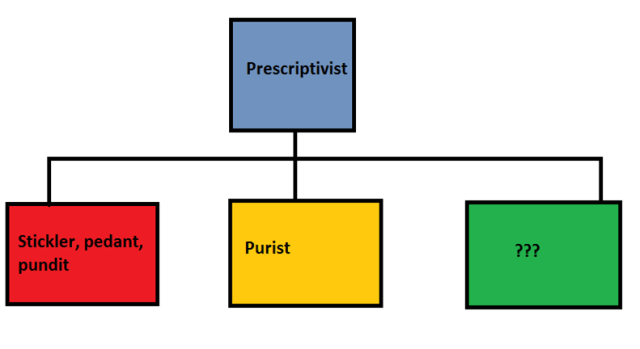Lonneke van Leest-Kootkar’s first blogpost is about sticklers and the rest of the prescriptive bunch:
Sticklers, pedants, pundits and purists: these are only a couple of terms to describe those prescriptivists who have the tendency to get worked up about language use and happily correct the mistakes of others.
I came to learn that the world of prescriptivism is one with a lot of negativity and hostility, the “Honey-controversy” being perhaps the most prominent example of this.
Apparently being a stickler makes it okay to make such claims as: “we got very worked up after 9/11 not because of Osama bin-Laden but because people on the radio kept saying ‘enormity’ when they meant ‘magnitude’, and we really hate that,” as Lynn Truss did in her introduction to Eats, Shoots and Leaves. Is it okay to be a stickler? Sure, why not? But what’s wrong with the attitude? Being fairly new to prescriptivism, I am still amazed and shocked when I come across remarks like these.
As a speaker of the Dutch Brabants dialect I was often corrected on my grammar. Us Brabanders are not too bothered with grammar: if you understand the general meaning we’re trying to convey we feel we’ve achieved our goal. I went through about 15 years of my life without knowing that there was a distinction between groter als mij (“bigger as me”) and groter dan mij (“bigger than me”), and you know what? Even if I say so myself, I turned out fine. Due to the efforts of a stickler-boyfriend I was taught some “proper” Dutch grammar. I still remember cringing every time I was corrected and forced into ‘proper’ grammar.
What is it that makes people feel this need to correct others in their language use? And why the pedantic attitude? Reading through Oliver Kamm’s Accidence will Happen, The Non-Pedantic Guide to English, I am reminded that prescriptivism doesn’t have to be pedantic, belittling or hostile. Kamm refers to himself as a “reformed stickler” but I think that a prescriptivist writing in a non-pedantic fashion deserves a term of its own that leaves behind the negative attitudes. In an attempt to classify the terms I feel that “purist” has a slightly less negative connotation than “stickler”, “pedant”or “pundit”, but I’m looking for a third category with positive connotations. Any suggestions?


Teacher
The other day I came accross this blopost in Spanish about prescriptivist attitudes and the author chooses the word “hablismo” to talk about it (Hablismo more or less understood as prescriptivism and levelled to other discriminatory attitutes such as racism or sexism). He defends the idea that we should stop transmitting the idea that certain varieties of the language are “wrong” (as it seems the case of Dutch Brabants or Andalusian Spanish, for instance).
I paste the link in case someone is interested:
View at Medium.com
Anyway, what about “language adviser” as a more positive term for stickler?
Not that I understand any Spanish, but the link seems to be missing ;)
Not an answer to your question, Lonneke, but I’m reading Rebecca Gowers’s new book Horrible Words (a kind of anti-usage guide), and she uses the word “griper”, which I quite like. And since we’re on the subject of Dutch, the word reminds me of the Dutch verb “griepen”.
Thanks for the new additions to my list!
We could always resurrect “normative”, which seems to have fallen out of fashion for grammars, and so doesn’t necessarily carry the connotations of “prescriptive”.
There’s always ‘maven’, bearing in mind that Steven Pinker borrowed the term from William Safire, who – perhaps a bit tongue-in-cheek – applied this Yiddish word for ‘expert to himself.